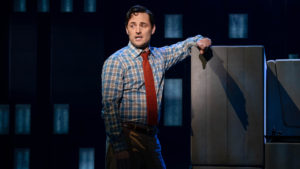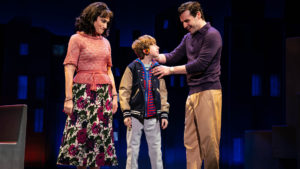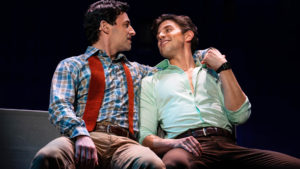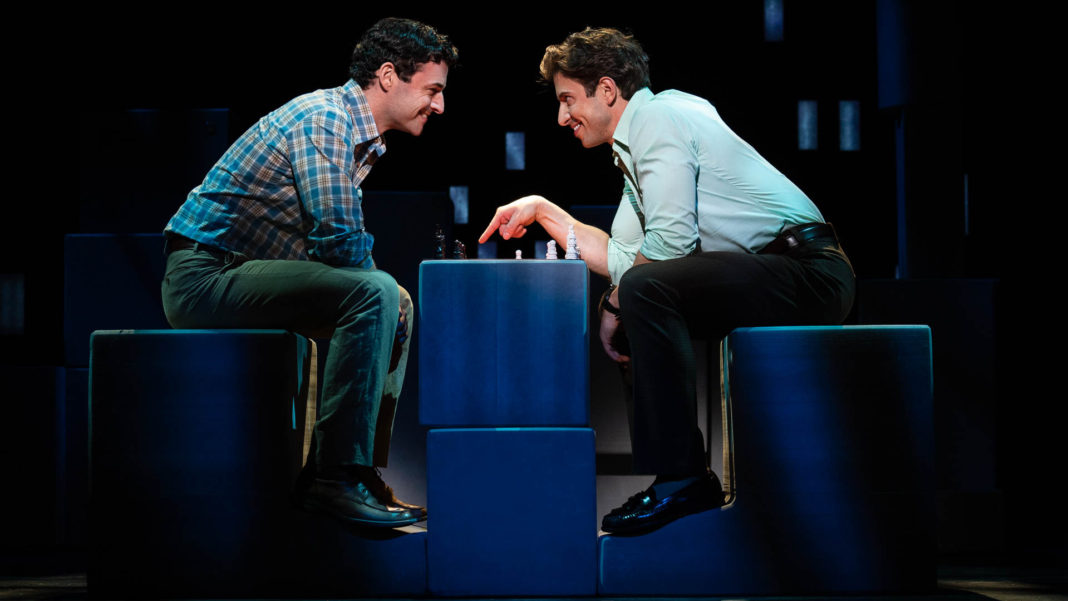You’d be hard-pressed to find a character more unlikeable at times than the role of Marvin in Falsettos. It isn’t that he left his wife and son for a man, it’s that he’s so damned angry about it all and childish to boot. You’d also be hard-pressed to find an actor more likable and, by his own definition, more innately old-fashioned, than the actor who plays that part in the national tour, Max von Essen. Eight times as week von Essen gets to live in Marvin’s skin at the Ahmanson Theatre where Falsettos runs through May 19th.
At the end of March, von Essen finished a run on Broadway in Anastasia. Prior to that he was Tony-nominated for his performance as Henri in An American in Paris. He was also in the revival of Evita as Magaldi.

When I spoke with him by phone, he had just arrived in Los Angeles from San Francisco where the tour of Falsettos began. We talked about the challenges of being Marvin and how this part is in stark contrast to the music he performs on his recently released CD, Call Me Old Fashion – the Broadway Standard.
What are the challenges of taking this journey eight times a week?
It’s been the most challenging role I’ve ever taken on without a doubt. The most difficult part is where I have to go emotionally. I’ve had trouble coping and letting go every night. To me the major theme of Falsettos is about these human beings in uncomfortable places in their lives and having to work through them. He really isn’t likable. He’s rash, he’s violent, he’s stubborn, he’s cold. The beautiful thing is he gets to change and redeem himself. He really gets a chance to grow up. You feel the audience change with you and it’s an awesome journey to take.

Actors like to be liked and to be likable. How do you get beyond that desire and allow yourself to place someone who is anything but likable?
It’s definitely been a struggle. Not only as an actor, but as a human being. Every role can’t be a likable role. It’s really difficult to be cruel on stage and hear the audience gasp. I have to know people have ugly moments. The point is to show it and how he changes.
Composer William Finn has written a very complex score. What makes this show challenging for you musically?
It was extremely difficult to learn. The rhythms, the notes, the different lines that people sing against each other are all very complex. We had two days for music on Act 1 before we were staging. As you know, we move everything. It’s like a math test. You’re trying to sing notes, learn rhythms and learn movements for blocking. Our heads were exploding. The harder thing is the endurance as it’s a sung-through show. But when you get it, it is so rewarding. Years ago if I had the opportunity I would have made an excuse to say “no.” I’ve gotten braver and a little more confident and it’s nice to know you can take on something of this magnitude and say, “I think I got this.”
If one wants to explore your range as a singer, they could put on Call Me Old Fashioned – The Broadway Standard which couldn’t be more different than Falsettos. I’m assuming since this is your solo debut, the material here is more in line with your personal sensibilities?
[The recording features songs such as “I Can’t Give You Anything But Love,” “Everything Old Is New Again” and “Almost Like Being in Love.”]
Yeah, I would say so. I was trying to figure out what I wanted to do for a solo show. Something as big as this it comes down to a fear of “it’s so much work,” and “what am I meant to sing.” Because An American In Paris felt so good in my voice, I knew I wanted it to have this throwback feel. Then it all just felt into place. It felt like a comfort zone.
You version of “Fly Me to the Moon,” is the most beautiful and simple arrangement I’ve ever heard. How did you and your music director, Billy Stritch, decide to do that arrangement?
One day I was sitting at my piano and was lazy and playing the song. I knew there was a verse, but it wasn’t in the sheet music I have. I uncovered it and thought how nice would it be to start this out of nowhere and as soon as I hit “Fly me to the moon…” then have Billy come in on that. He had his own feel and we came up with it together.

Part of the lyric in “What Would I Do?,” the last song in Falsettos, says “Once I was told that good men get better with age.” Do they and have you gotten better with age?
Ha! So far yes. I’ve learned to enjoy what I’m doing and it doesn’t pass me by. I do feel like there was a time when I didn’t want to hear myself or think of myself performing. I’m not super confident by any means, but I know who I am. I’ve learned a lot and I’m still learning, but I know now I can take on big challenges. I didn’t do that ten years ago. I let it scare me. Like with Falsettos or Call Me Old Fashioned, you can take on something you never thought you could handle. It’s nice to have that sense of knowing now.
For tickets go here.
Main Photo: Max von Essen and Nick Adams in Falsettos. Photo by Joan Marcus
All production photos by Joan Marcus/Courtesy of Center Theatre Group










